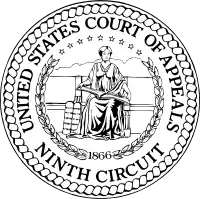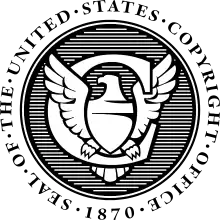Pharrell Williams v. Bridgeport Music
Pharrell Willams et al. v Bridgeport Music et al., No. 15-56880 (9th Cir. July 11, 2018) is a United States Court of Appeals for the Ninth Circuit case concerning Copyright Infringement of Sound Recording. In August 2013, Pharrell Williams, Robin Thicke and Clifford Joseph Harris (known by his stage name, “T.I.”) filed a complaint for declaratory relief against the members of Marvin Gaye's family and Bridgeport Music in the United States district court for the Central District of California; that the song Blurred Lines did not infringe the copyright of defendants in Got To Give It Up and Sexy Ways respectively.
| Pharrell Williams v. Bridgeport Music | |
|---|---|
 | |
| Court | United States Court of Appeals for the Ninth Circuit |
| Full case name | Pharrell Williams et al v. Bridgeport Music et al |
| Argued | October 06, 2017 |
| Decided | March 22, 2018 |
| Citation(s) | Williams v. Gaye, 895 F.3d 1106 (9th Cir. 2018) |
| Case history | |
| Appealed from | United States District Court for the Central District of California |
| Holding | |
| The panel partially affirmed the District Court's Judgement after a Jury trial. Copyright Protection in Musical composition is not limited to a narrow range of expressions. | |
| Court membership | |
| Judge(s) sitting | Milan Smith, Mary H. Murguia,and Jacqueline H. Nguyen |
| Case opinions | |
| Decision by | Milan D. Smith Jr |
| Concurrence | Mary H. Murguia |
| Dissent | Jacqueline H. Nguyen |
| Laws applied | |
| Copyright Act of 1976; 17 U.S.C. §§ 101, 102, 106, 504, 505 | |
On 6 October 2017, Circuit Court held oral arguments on the appeal to vacate the district court’s Judgement.[1] The Ninth Circuit upheld the District Court's decision against William and Thicke and affirmed liability of millions of dollar as damages. It was established that "Got to give it up" is "entitled to broad protection against copyright infringement liability because musical compositions are not confined to a narrow range of expression".[2]
Background
Blurred Lines is a song by American songwriter Thicke, William and rapper T.I. It was an undeniable hit, spending 12 weeks at the top of the Billboard Hot 100 and ultimately reaching the number two spot on the year end Billboard Hot 100.[3]
However, the song became a subject for bitter dispute with Gaye's family and Bridgeport Music, who claimed that the song infringed on their copyright and is inspired by their songs i.e. 'Got to give it up' and 'Sexy Ways' respectively.
Complaint for declaratory relief
Notably, unlike the traditional manner, the litigation started with preemptive filing of declaratory relief. On August 2013, Williams, Thicke and T.I filed a complaint for declaratory relief against Gaye's family and Bridgeport Music. Prior to the complaint, Gaye's family and Bridgeport Music alleged that the plaintiff has "ripped-off" the 1977 Billboard single, " Got to Give it Up". The complaint argued that, "The basis of the Gaye defendants' claims is that "Blurred Lines" and "Got To Give It Up" "feel" or "sound" the same. Being reminiscent of a "sound" is not copyright infringement. The intent in producing "Blurred Lines" was to evoke an era. In reality, the Gaye defendants are claiming ownership of an entire genre, as opposed to a specific work".[4] They argued that they did not copy the expression but only the 'idea' or the 'genre', which is not copyright-able.
Plaintiff's disposition
Pharrell Williams stated that the two songs were "completely different" adding that "Just simply go to the piano and play the two. One's minor and one's major. And not even in the same key".[5] Robin Thicke stated that at the time of recording he was, "high on Vicodin and alcohol when [he] showed up at the studio", and so "Pharrell had the beat and he wrote almost every single part of the song".[6]
Counter-claim
In the counter-claim Gaye's family argue that the songs were not merely stylistically similar; instead, they claim that "Many of the main vocal and instrumental themes of Blurred Lines are rooted in Got to Give it Up; namely, the signature phrase, vocal hook, backup vocal hook, their variations, and the keyboard and bass lines" and "the substantial similarities are the result of many of the same deliberate creative choices made by their respective composers."[7]
Motion for summary judgement
In July 2014, the plaintiff's filled for a motion of summary judgement arguing. However, on 30th October 2014, the court denied the motion. Judge John A. Kronstadt after reviewing the reports from competing musicologists, decided that, "[the plaintiffs] have made a sufficient showing that elements of 'Blurred Lines' may be substantially similar to protected, original elements of 'Got to Give It Up'."[8]
Holding
Trial
The trial started in District Court on 10 February 2015.[9] Plaintiffs filed a successful motion in limine pleading that Gaye's sound recording of "Got to give it up" shall be excluded from being played during the trial.[10] The motion was successful since Marvin Gaye's voice had no relevance in the case. The dispute was limited to the elements from sheet music. Judge Kronstad stated that, "I don't expect Gaye's voice to be a part of the case".[11]
The jury was to decide whether "Blurred Lines" infringed upon the following limited elements: i) Signature Phrase ii) Hooks iii) Bass Lines iv) Harmonic Structures, and v) Keyboard Chords.[12] The Jury was allowed to hear a limited portion of Gaye's sound recording that substantially reflected the disputed subject-matter. The portion was edited to remove unprotected elements.
On 10th March 2015, the jury unanimously found Thicke and Williams liable for copyright infringement. It awarded a sum of $7.4 million as damages for the infringement to Gaye's family. The amount was reduced by the District Court to $5.3 million, along with 50 percent royalty on future songwriter and publishing revenue of Blurred Lines.[13]
On 11 January 2016, Gaye's family moved an application for approximately $3.5 million in attorney fees and costs on the grounds that the jury verdict prevailed on merits, rather than on a technical issue.[13] The Court denied the application and ordered further submissions on the issue of costs.
Appeal
In August 2016, Thicke, Williams and T.I. appealed against the judgement on the grounds that the Gaye family failed to show substantial similarity between the two songs. Later, a number of amicus curiae briefs were filed in support of the appeal by musicians, musicologists and copyright scholars. Musicians such as John Oates, R. Kelly, et al. filed the brief drafted by attorney Edwin McPherson. They claimed that the judgement would have a deleterious effect on innovation in popular music industry and that the jury's verdict was based on flawed testimony by Gaye's family musical expert. In March 2018, the Court of Appeals upheld the District Court's decision against Williams and Thicke.
Dissent
Appellate Court Judge Jacqueline Nguyen, in her dissenting opinion, held that "Blurred Lines" and "Got to Give Up" were not subjectively similar. These songs differed in "melody, harmony" and "rhythm" and thus lack extrinsic similarity. She claimed that the judgement allows for protection over musical style and stated that, “ [it] establishes a dangerous precedent that strikes a devastating blow to future musicians and composers everywhere”.[14]
Subsequent development
In December 2019, Gaye filed a second attempt for attorney's fees and costs based on Williams remark after the disposition was in favor of Gaye's. In March 2020, Pharrell Williams has filed a counter-claim for the same.
Commentary and implication
Copyright scholars and musicians closely followed the case since it directly addressed the question of copyright protection for sheet music elements other than melody, harmony and rhythm. Many scholars have expressed concern that the case can open a pandora's box of litigation and will cause substantial damage to the music industry, potentially causing a chilling effect.[15] Another concern was that the case was essentially decided by the jury and judge, thus potentially failing the requirement of 'extrinsic test'. Another set of scholars supports the judgement, claiming that the revenue of the music industry is not impacted.[16]
See also
- Substantial Similarity
- Inverse-Ratio Rule
- Swirsky v. Carey
- Skidmore v. Led Zeppelin
- Three boys music v. Bolton
- Marcus Grey et al. v. Katy Perry et al.
- Rice v. Fox Broadcasting Co.
References
- "Audio and Video". www.ca9.uscourts.gov. Retrieved 2020-06-20.
- "Williams v. Gaye, No. 15-56880 (9th Cir. 2018)". Justia Law. Retrieved 2020-06-20.
- "Blurring Lines? The Practical Implications of Williams v. Bridgeport Music". www.americanbar.org. Retrieved 2020-06-20.
- "Robin Thicke's Song Sounds Like Marvin Gaye. So He's Suing Gaye's Family". NPR.org. Retrieved 2020-06-20.
- Murrow, Emerald (2013-09-13). "Pharrell Talks about Battle Over Blurred lines".
- "Robin Thicke Admits Drug Abuse, Lying to Media in Wild "Blurred Lines" Deposition (Exclusive)". The Hollywood Reporter. Retrieved 2020-06-20.
- "Pharrell Williams, et al. v. Bridgeport Music, et al. [INPLAY] | Music Copyright Infringement Resource". blogs.law.gwu.edu. Retrieved 2020-06-20.
- "Williams et al. v. Bridgeport Music Inc | Fish". www.fr.com. 2014-11-14. Retrieved 2020-06-20.
- "Robin Thicke, Pharrell Williams lose first round in 'Blurred Lines' case". Los Angeles Times. 2014-10-30. Retrieved 2020-06-20.
- "Will a Jury Get to Hear Marvin Gaye Sing at the 'Blurred Lines' Trial Next Month?". The Hollywood Reporter. Retrieved 2020-06-20.
- "Marvin Gaye Recordings Barred From 'Blurred Lines' Trial - Law360". www.law360.com. Retrieved 2020-06-20.
- PJuhasz (2015-06-29). "Blurred Lines Copyright Infringement - Patent Preemption". Juhasz Law. Retrieved 2020-06-20.
- "Williams v. Bridgeport Music, Inc. | Publications | Loeb & Loeb LLP". www.loeb.com. Retrieved 2020-06-20.
- Editor, Staff. "Williams v. Gaye Rules that Blurred Lines Infringes on the Copyright in "Got to Give it Up"". Retrieved 2020-06-20.CS1 maint: extra text: authors list (link)
- "Ninth Circuit says 'Blurred Lines' Infringed Marvin Gaye's 'Got To Give It Up'". IPWatchdog.com | Patents & Patent Law. 2018-03-21. Retrieved 2020-06-20.
- Burroughs, Scott Alan. "The Courts Call It Correct In 2 Massive Recent Copyright Cases". Above the Law. Retrieved 2020-06-20.
Further reading
- Reitz, D., 2015. An Analysis Of The Evidence Against "Blurred Lines". [online] Ludwig van Toronto.
- Cronin, C., 1998. Concepts of Melodic Similarity in Music-Copyright Infringement Suits. Computing in Musicology. Walter B. Hewlett, Eleanor Selfridge-Field, eds.
- Joseph P. Fishman, Music as a Matter of Law, 131 Harv. L. Rev. 1861 (2018).
External links
- "Robin Thicke – Blurred Lines ft. T.I., Pharrell" music video
- https://www.ca9.uscourts.gov/media/view_video.php?pk_vid=0000012297
- https://cdn.ca9.uscourts.gov/datastore/opinions/2018/03/21/15-56880.pdf
- https://cpb-us-w2.wpmucdn.com/blogs.law.gwu.edu/dist/a/4/files/2018/12/Williams-v.-Gaye_COMPLAINT.pdf
- https://www.fr.com/wp-content/uploads/2014/11/Pharrell-Williams-et-al.-v.-Bridgeport-Music-Inc-et-al.-CD-Cal.-Order-Summary-Judgment.pdf
- https://cpb-us-w2.wpmucdn.com/blogs.law.gwu.edu/dist/a/4/files/2018/12/WilliamsOrderSheetMusic-s0wvh1.pdf
- https://cpb-us-w2.wpmucdn.com/blogs.law.gwu.edu/dist/a/4/files/2018/12/songwriters-brief-223429b.pdf
- https://cpb-us-w2.wpmucdn.com/blogs.law.gwu.edu/dist/a/4/files/2018/12/Gaye-Relief.pdf
